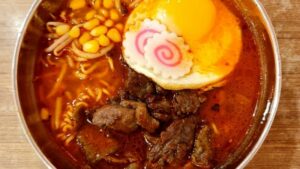Ramen noodles are beloved by college students, busy parents, and noodle fanatics alike for being tasty, inexpensive, and easy to whip up. But can slurping down those steaming bowls of noodles actually give you cancer? It’s a scary question for ramen lovers!
The good news is that ramen likely doesn’t directly cause cancer. However, regularly eating high amounts may indirectly increase cancer risks over time due to some questionable ingredients and the lack of nutrients. By understanding the facts, you can make informed choices and find balance as a ramen fan.
While ramen itself doesn’t contain some mythical “cancer-causing wax,” there are reasons instant noodles aren’t considered a health food. Let’s dig into the reality behind the hype on ramen’s controversial ingredients and potential health impact. Get ready to slurp your noodles with more peace of mind!
Debunking the Myths: Does Ramen Contain Wax or Directly Cause Cancer?
Some viral rumors claim ramen contains cancer-causing wax or directly leads to cancer. But this is false. Here’s the reality behind the myths:
No Evidence of Wax
There’s no proof that wax is an ingredient in ramen noodles. Noodle manufacturers and fact checkers have disproven this myth. Wax is not typically used in ramen production.
Ramen Doesn’t Directly Cause Cancer
No clear scientific evidence shows instant noodles directly cause cancer. However, regular high consumption may increase cancer risk indirectly due to lacking nutrients and containing potentially harmful substances.
So while the idea that slurping ramen will immediately give you cancer is untrue, there are still reasons for caution based on the nutrients, preservatives, and processing.
Why Ramen May Indirectly Boost Cancer Risks
Ramen lacks nutrients and contains potentially harmful ingredients that could contribute to increased cancer risks with regular high consumption.
Poor Nutritional Value
Instant noodles are low in fiber, protein, vitamins, and minerals, while high in refined carbs, fat, and sodium. This poor nutrient profile may negatively impact health over time.
Links to Cancer Risk
A large study found higher ultra-processed food intake, including ramen, was associated with increased cancer rates. The reasons are unclear but could be related to lacking nutrients, additives, and high sodium levels.
Cancer-Causing Substances
Some instant noodle brands were found to contain benzopyrene, a carcinogen. This highlights the importance of proper manufacturing and monitoring for harmful ingredients.
So while ramen won’t immediately give you cancer, the low nutritional value, preservatives, and sodium may indirectly influence cancer risk to some extent when eaten regularly in large amounts.
Ramen’s Lack of Fiber and Essential Nutrients
Besides questionable ingredients, ramen lacks nutrients vital for good health. Here’s a closer look at how ramen is nutritionally deficient:
Almost No Fiber
Ramen is very low in fiber since it’s made from refined wheat flour. Fiber is essential for digestive health, gut bacteria, hydration, and reducing heart disease and diabetes risks.
Deficient in Essential Vitamins and Minerals
Ramen lacks most vitamins and minerals. Some brands add synthetic nutrients like iron, but it still misses a host of micronutrients only found in whole foods.
Weight Gain Risks
The refined carbs, fat, and sodium in ramen can promote overeating and weight gain when consumed regularly. Obesity increases cancer risks.
Weakened Immunity
Missing nutrients like vitamin C, zinc, and magnesium can weaken immunity over time. Poor immunity is linked to increased infections and cancer.
Clearly ramen noodles are not a complete, balanced meal. Relying too heavily on ramen could lead to nutrient deficiencies, weakened immunity, and higher risks of cancer and other diseases.
Why Excess Sodium Raises Health Concerns
Ramen is notoriously high in sodium, which could negatively impact health in several ways:
- Most ramen servings contain over half the recommended 2400 mg daily sodium limit.
- High sodium is linked to increased risks of stomach cancer, stroke, heart disease, and kidney disease.
- Too much sodium can increase blood pressure and cause fluid retention, heart damage, and kidney strain.
- Processed foods including ramen make up a major source of excess sodium in many diets.
Consuming instant noodles and other high sodium foods regularly can really add up over time, potentially leading to serious health consequences.
Evaluating MSG and Its Health Effects
Monosodium glutamate, or MSG, is another controversial ingredient used in many instant noodles. But what does science say about its health impact?
Conflicting Findings on MSG, Diabetes, and Weight
Studies reveal mixed results on MSG’s effects on blood sugar, diabetes risk, satiety, and weight management. More research is needed for conclusive answers.
Potential Links to Metabolic Disorders
Some research indicates higher MSG intake may be associated with conditions like insulin resistance and elevated blood sugar. But more evidence is required.
Possible Increased Blood Pressure Risks
Several studies link MSG consumption with higher risks of high blood pressure, particularly in Asian populations that tend to consume more MSG.
Overall, MSG’s role in cancer risks and other health conditions needs further investigation. Limiting intake until more evidence emerges may be prudent.
Recalls and Contamination Concerns with Ramen
Like any processed food, ramen does carry risks of contamination and recalls when safety protocols aren’t followed:
- Recalled foods may be contaminated with bacteria, allergens, objects, or improperly processed ingredients that could make consumers sick. Consuming recalled products should always be avoided.
- Some common recall causes include undeclared allergens like peanuts or tree nuts, which could trigger dangerous reactions in sensitive individuals.
- Following recall alerts from the FDA and CDC can help consumers stay informed about potentially hazardous recalled products.
- Proper oversight, manufacturing practices, and testing help minimize contamination risks. But when discovered, companies should issue alerts and recalls promptly.
While major recalls of popular brands are rare, being aware of potential issues can help you make fully informed choices as a consumer.
Analyzing Other Controversial Ramen Ingredients and Additives
Beyond MSG, some other substances used in ramen production have raised health questions:
Ethylene Oxide
This gas is used to sterilize some
Tertiary-Butyl Hydroquinone (TBHQ)
TBHQ is a preservative that may have toxic effects on cells at high doses. More studies are needed on real-world dietary exposure levels.
“Natural Flavors”
This vague term doesn’t reveal much about what’s added to enhance flavor. Being more transparent about specific ingredients would enable better analysis.
Palm Oil
Some brands use palm oil, which contains high levels of saturated fats that may raise cholesterol and heart disease risks.
More research is still needed on these additives, but avoiding highly processed ingredients when possible is generally advised.
Healthy Ramen Alternatives and Balanced Eating Tips
Ramen probably won’t directly cause cancer if you enjoy an occasional bowl. But relying too heavily on any processed food in your diet isn’t ideal. Here are tips for healthy moderation:
- Choose ramen with less sodium, MSG, and suspicious additives when possible
- Enjoy ramen as an occasional treat, not a daily meal
- Balance out processed foods with generous amounts of whole, nutrient-dense foods like vegetables, fruits, legumes, whole grains, nuts, seeds, and lean proteins
- Prepare ramen with extra veggies, eggs, or meat to add nutrients
- Opt for alternative noodles like konjac, soba buckwheat, or zucchini noodles
- Make your own broth using real chicken, beef, or vegetable stock
- Pair ramen with sides like kimchi, miso soup, edamame, or Brussels sprouts
By being an informed consumer, varying your diet, and not overindulging, you can slurp ramen while maintaining a healthy lifestyle. Moderation and balance is key!
The Bottom Line
Ramen won’t directly give you cancer. But regular high consumption may increase cancer risk indirectly based on low nutrients, high sodium, and questionable ingredients. Following recalls, choosing better options, and enjoying ramen in moderation as part of a balanced diet can allow you to slurp those noodles while protecting your health.





